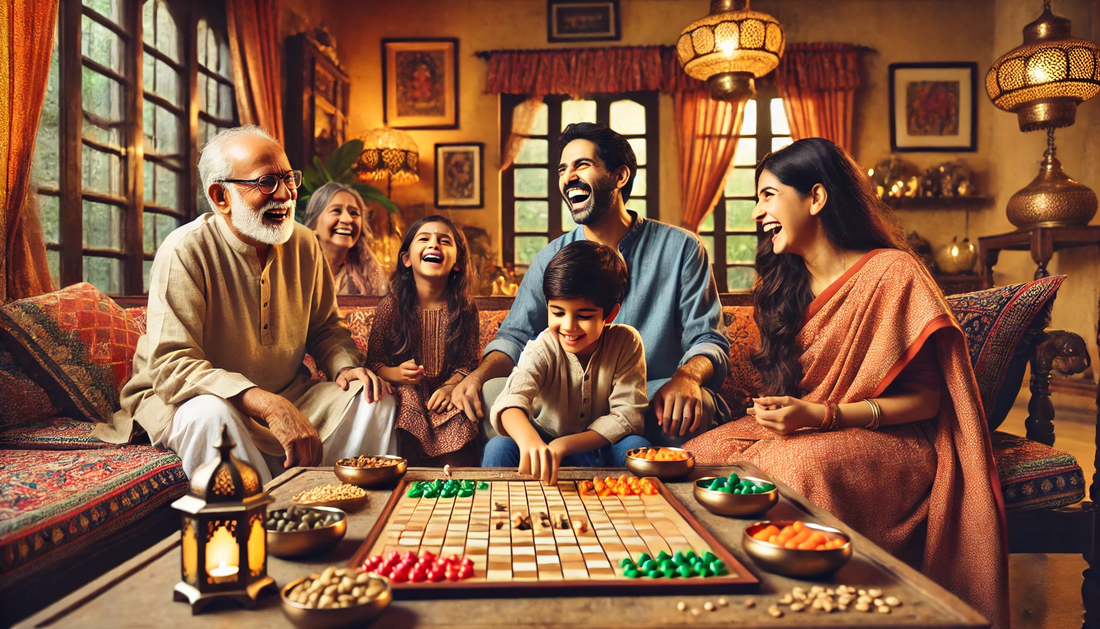
The Power of Board Games: Strengthening Family Bonds Through Play
Share
In today’s fast-paced world, families often struggle to spend quality time together. Between work, school, and digital distractions, meaningful connections can sometimes take a backseat. Enter board games – a timeless solution to bring everyone together around the same table. Not only do these games provide fun and entertainment, but they also foster family bonding, improve communication, and strengthen relationships.
Why Board Games Are Ideal for Family Bonding
Board games are more than just a source of amusement; they create an environment that encourages face-to-face interactions. Unlike individual screen time, where engagement is limited, playing board games involves active participation and collaboration.
Encouraging Communication
When families sit down to play, they engage in discussions, negotiations, and even friendly debates. Games like Chowka Bara or Aadu Huli from Roll the Dice require strategy and teamwork, prompting players to communicate effectively. Over time, these conversations can enhance understanding and reduce misunderstandings.
Building Emotional Connections
Shared laughter during a funny game moment or collective excitement after a close win can create lasting memories. This emotional engagement fosters a sense of belonging and strengthens familial ties.
Promoting Teamwork
Cooperative games, such as Pandemic or Race for Modakas, require players to work together to achieve a common goal. Such experiences teach families the value of teamwork and highlight each member’s strengths.
Benefits of Playing Board Games as a Family
The advantages of playing board games extend beyond bonding. Here’s how these activities positively impact both parents and children:
1. Enhancing Cognitive Skills
For children, games like Pagade or Navakankari develop critical thinking, problem-solving, and decision-making abilities. Adults, too, benefit from mental stimulation, improving memory and focus.
According to a study published in the journal Behavioural Brain Research, engaging in activities that challenge the brain, such as playing games, can enhance cognitive flexibility and delay age-related cognitive decline.
2. Teaching Life Lessons
Games often mirror real-life scenarios, teaching valuable lessons like patience, resilience, and the importance of fair play. For example, losing gracefully in a game provides children with the skills to handle disappointments in life.
3. Strengthening Family Values
Traditional games like Taabla or Sholo Gutti from Roll the Dice often carry cultural significance. Playing these games helps children connect with their heritage and fosters a sense of pride in family traditions.
4. Reducing Stress and Anxiety
Laughter and fun during gameplay can alleviate stress, creating a relaxed environment for open conversations. A Harvard Medical School report notes that leisure activities, including games, are crucial for reducing stress and improving mental health.
Creating a Positive Game Environment
For board games to have the desired impact, it’s essential to create a positive environment where everyone feels included. Here are a few tips:
Set Aside Screen-Free Time
Dedicate specific hours for gameplay, ensuring that phones, TVs, and other distractions are turned off.
Choose Games Suitable for All Ages
Select games that accommodate different age groups so everyone can participate. For example, Vimanam, a game designed to be engaging yet simple, appeals to both children and adults.
Celebrate Every Player’s Contributions
Whether someone wins or loses, acknowledge their efforts and encourage a healthy competitive spirit.
How to Get Started
If you’re new to family board games, start small. Introduce simple games like Snakes and Ladders or Chausar before moving on to more complex options. Platforms like Roll the Dice offer a variety of traditional and contemporary games that cater to every family’s needs.
Join a Community
Consider joining local or online gaming communities to explore new games and connect with other families. Community events often host game nights, providing opportunities for both learning and socializing.
Make It a Tradition
Incorporate board game nights into your routine, whether it’s a weekly tradition or a special holiday activity. Consistency ensures that family members look forward to these sessions.
How Do Families Stay Happy and Connected with Each Other?
Staying happy and connected as a family has become increasingly challenging in today’s world. Factors such as work pressure, academic demands, and over-reliance on digital devices often create barriers to effective communication and shared experiences. However, there are steps families can take to nurture their bonds:
Open Communication
Encourage open and honest conversations about each family member’s day-to-day experiences, challenges, and feelings. Setting aside time for family discussions, even for just a few minutes daily, can create a foundation of trust and understanding.
Prioritizing Quality Time
Shared activities such as cooking, playing games, or even going for a walk can bring families closer. Consistently scheduling time for these activities can help members reconnect amidst their busy lives.
Limiting Screen Time
Excessive screen usage often isolates family members. Setting boundaries for device use and promoting screen-free activities like board games or outdoor play can encourage face-to-face interaction.
Practicing Empathy
Understanding and respecting each other’s perspectives is vital for maintaining harmony. Activities like collaborative games or storytelling sessions can instill empathy and appreciation for one another.
Acknowledging Achievements
Celebrating small victories, whether it’s a good grade, a promotion, or even completing a household chore, reinforces positivity and motivates family members to support one another.
Addressing Social Challenges
Modern families face issues such as work-life imbalance, social isolation, and a lack of shared values. Actively addressing these challenges by fostering traditions, celebrating cultural roots, and practicing mindfulness can help create a resilient and happy family environment.
Real-Life Stories: Families Transformed by Games
Rekindling Bonds
Priya, a working mom of two, shares how board games helped her reconnect with her teenage children. “We started playing Jaya: The Real Game, Real Heroes, and it opened up so many conversations about Indian mythology and teamwork. Now, it’s our Friday ritual,” she says.
Bridging Generational Gaps
For families with grandparents, traditional games like Alaguli Mane serve as a bridge between generations. These games bring stories of the past to life, helping younger family members appreciate their roots.
The Cultural Significance of Traditional Indian Games
India’s rich history of board games reflects its diverse culture. Games like Chowka Bara and Aadu Huli are more than just entertainment; they are a celebration of strategy, storytelling, and art. Introducing these games to your family not only strengthens bonds but also preserves a piece of cultural heritage.
Explore Roll the Dice’s Collection to find games that resonate with your family’s interests.
Board games are a simple yet profound way to bring families closer. They encourage communication, build emotional connections, and provide a shared sense of joy. Whether you’re strategizing in Navakankari, laughing over a game of Snakes and Ladders, or learning cultural stories through Pagade, the benefits of these interactions are immeasurable.
So, what are you waiting for? Gather your family, pick a game, and let the bonding begin. And don’t forget to check out Roll the Dice for a wide range of traditional and modern board games to kickstart your journey!
